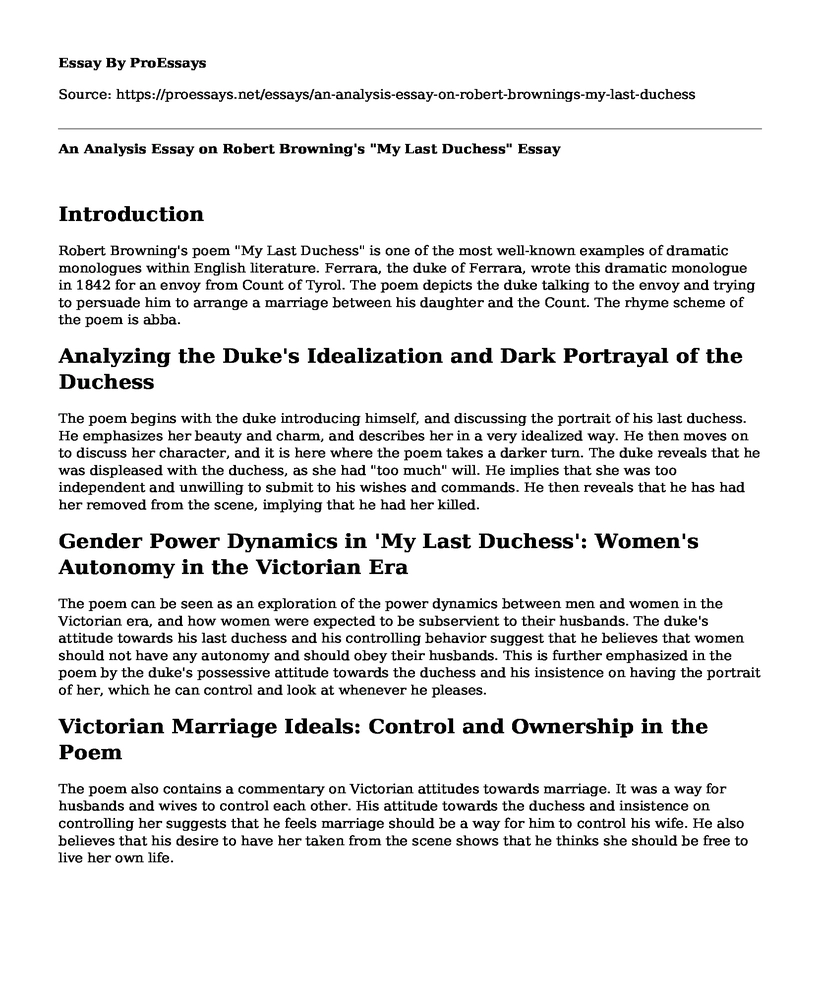Introduction
Robert Browning's poem "My Last Duchess" is one of the most well-known examples of dramatic monologues within English literature. Ferrara, the duke of Ferrara, wrote this dramatic monologue in 1842 for an envoy from Count of Tyrol. The poem depicts the duke talking to the envoy and trying to persuade him to arrange a marriage between his daughter and the Count. The rhyme scheme of the poem is abba.
Analyzing the Duke's Idealization and Dark Portrayal of the Duchess
The poem begins with the duke introducing himself, and discussing the portrait of his last duchess. He emphasizes her beauty and charm, and describes her in a very idealized way. He then moves on to discuss her character, and it is here where the poem takes a darker turn. The duke reveals that he was displeased with the duchess, as she had "too much" will. He implies that she was too independent and unwilling to submit to his wishes and commands. He then reveals that he has had her removed from the scene, implying that he had her killed.
Gender Power Dynamics in 'My Last Duchess': Women's Autonomy in the Victorian Era
The poem can be seen as an exploration of the power dynamics between men and women in the Victorian era, and how women were expected to be subservient to their husbands. The duke's attitude towards his last duchess and his controlling behavior suggest that he believes that women should not have any autonomy and should obey their husbands. This is further emphasized in the poem by the duke's possessive attitude towards the duchess and his insistence on having the portrait of her, which he can control and look at whenever he pleases.
Victorian Marriage Ideals: Control and Ownership in the Poem
The poem also contains a commentary on Victorian attitudes towards marriage. It was a way for husbands and wives to control each other. His attitude towards the duchess and insistence on controlling her suggests that he feels marriage should be a way for him to control his wife. He also believes that his desire to have her taken from the scene shows that he thinks she should be free to live her own life.
Conclusion
Robert Browning's poem, "My Last Duchess", is a great example of dramatic monologue. It also explores the power dynamics of men and women during the Victorian era. This poem is a commentary about attitudes towards marriage. The duke's controlling and possessive attitude towards the duchess mirrors the attitudes of the times.
Cite this page
An Analysis Essay on Robert Browning's "My Last Duchess". (2022, Dec 16). Retrieved from https://proessays.net/essays/an-analysis-essay-on-robert-brownings-my-last-duchess
If you are the original author of this essay and no longer wish to have it published on the ProEssays website, please click below to request its removal:
- The Yellow Wallpaper Literary Analysis Essay
- Components of Myths Argumentative Essay
- A Response on the Oedipus the King Essay Example
- Essay Sample on Bitch & Raven: Two Poems of Contrasting Personas
- Essay Example on Romance and Revolution: A Journey of Self-Discovery in 'As You Like It'
- Essay Example on The Hybridity of Mary Jemison & Mary Rowlandson: A Cultural Uneasiness
- Essay Example on Comparison of Motifs in Virginia Woolf's 'A Haunted House' and Henry James' 'The Jolly Corner'







